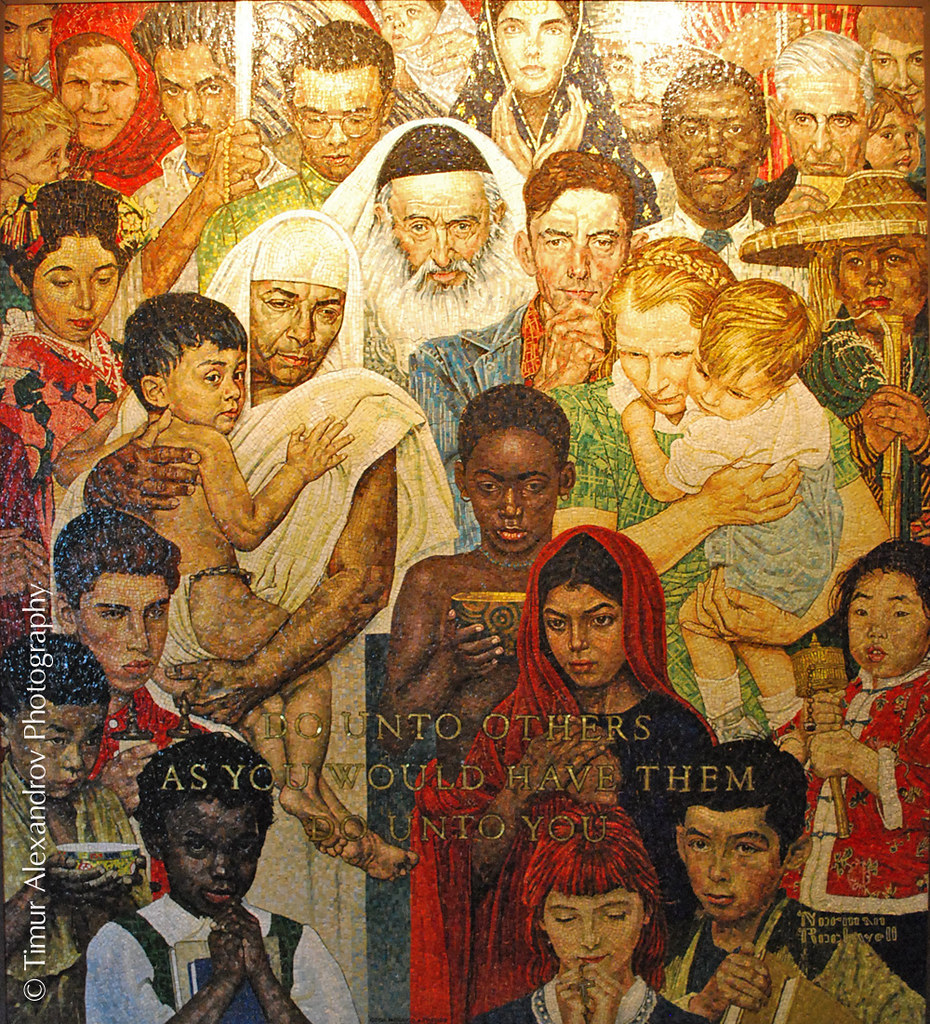
The perpetrators of the horrible gas attacks in Syria, if the attacks are true, should be dealt with swiftly and harshly – not the country – the decision-makers and the perpetrators.
This is a “hot-button” issue with me, and has been for many years. I am a relentless and unforgiving opponent of the use of chemical or biological weapons and the people who condone it.
My hatred of this stems NOT from any sense of humanity or self-righteous indignation. It stems from a crotchety old man, a rainbow, and a piece of bread.
When I was growing up during the fifties and sixties, our neighborhood was a neighborhood in transition. It was older people with a growing mixture of younger families. Unlike neighborhoods today, both the old and the young families stayed life-long residents. I was four years old when we moved in, and in my late twenties when my parents finally sold it and moved to retirement climes.
One of our next door neighbors during those early years was an elderly couple.
The wife was nice, but her husband was a crotchety old man. He was short and thin, with a scarred, partially bald head, and he wore thick glasses. Because he was retired, he’d sit on his porch daily during the good weather and rule his fiefdom with an iron hand. He had rules about his fence, rules about noise, rules about our-ball-in-his-yard – rules ad nauseam. I wouldn’t be surprised if he even had fly over rules for commercial aircraft!
My parents always rolled their eyes when I complained each time (or nodded their heads gravely when he did). However, the results were always lop-sided: They insisted that I respect EACH and every rule. Their fav saying: When YOU grow up…etc. Their unyielding dictum: Respect the dignity of others.
So, grumbling, I ‘respected’ his commandments (or perhaps I ‘respected’ my parents’ creative ways of reducing my privileges – take your pick).
However, one day, when I was nine, that all changed.
I’ll never forget the entire scene at the time.
It was one of those lazy summer days. The sky was a deep cerulean with a white-as-cotton cloud or two wafting by. I was in our yard by myself playing army. I was practicing dying in cool ways for the next neighborhood army battle because the guy who could die cool became a revered soul.
I was being relatively soundless save the occasional rifle sound or the uhhh sound as I expired. Suddenly, I heard HIM. That crotchety old man was yelling for me. I remember thinking, NOW what’s he gonna complain about? I turned around to see him waving me over to the fence.
Warily, I approached.
“I see you like playing army. Have you ever see a man die?“
Of all the questions he could have asked me that day, I would NEVER have picked that one! And since this was the America before mass shootings and so forth, I, of course, said no.
He looked at me for a minute, as if debating something. Then, apparently decision made, he leaned on the fence and said, “I wanna tell you a story.”
What I heard, shocked me for the rest of my life.
It takes place during that first world-wide war they called “The Great War For Civilization” on the medal and, ironically, “The War to End All Wars” in the history books. He just called it ‘The Great War.’
A little backstory here: W.W. I actually began in Europe in 1914, but the Americans didn’t get militarily involved until April, 1917. By November of that year, the American Expeditionary Force (A.E.F.) landed four divisions ‘over there’ in France.
One of them was the 42nd Infantry Division, nicknamed the “Rainbow Division” because it was formed by National Guard units from twenty-six states – each unit hand-picked by the government. The division even had a creative shoulder patch – the now famous “rainbow” design. [See the image below.]

He was a member of one of those units in the Rainbow Division – the 69th NY National Guard Regiment (renumbered the 165th NY). Just after war was declared in April, he and several of his New York City neighborhood buddies joined the national guard so they could fight together. However, this group of patriots was split up when the unit he and one other buddy were in was selected for that new division.
The division was quartered at Camp Mills, N.Y., and he rubbed shoulders with quite a few “Rainbowers” who went on to become famous – the poet Joyce Kilmer, Douglas MacArthur, William “Wild Bill” Donovan, and Father Francis Duffy to name a few.
The division shipped out piecemeal from NY harbor to France from October through December of 1917. After being seasick on the troop ship for most of the voyage, he and his buddy from home arrived with their unit in November 1917 on the shores of France.
At that point, they were loaded in French boxcars and shipped, like freight, to their staging area at Vancouleurs, France. By Christmas, the entire division was present. However, before going ‘into the line’ as he called it, they were told they needed some additional training with a French unit on the basics of war – trench-style.
So the day after Christmas 1917, the 26,000 men in their division marched to their new training camp.
Talk about a fiasco!
Their destination, Rolampont, was sixty-some miles from Vancouleurs over some rugged, unpaved roads. The weather was horrible with below zero temperatures, snow, and many of the units didn’t have the clothes for sustained cold-weather exposure. Shoes fell apart or hobnailed boots froze their feet. Horse-drawn wagons and caissons carried their meager supplies and their artillery. Several times, he said, they had to put their shoulders to a wagon help the exhausted horses draw it up the hills.
That march took four days, and because his buddy carried his rifle and practically carried him the last few miles, they both finished standing-up.
Welcome to France!
In February 1918, the 165th saw combat for the first time at Rouge Bouquet. Twenty of them died when a shell burst on a dugout, and they were buried alive in the mud – without ever firing a shot at the enemy.
While war itself is dehumanizing, the trench warfare that he and all the other fighting men experienced in that war was a terrible, miserable, truly inhuman experience.
He described the rice-sized lice [cooties], and the appalling number and size of the rats [trench rabbits] constantly scurrying throughout the water-soaked/mud filled trenches and dug out rooms [cubbyholes] in which they lived, fought, and died. He explained how to make a mattress out of flour and potato sacks stuffed with pine branches and needles. He recounted the muddy taste and the tainted odor of their food and the percussive pounding of the never-ending artillery barrages. He detailed the fear generated by finding unexploded shells [duds] and said time and time again, that life and death were nothing more than the whim of luck, not God.
That his narration had a profound effect on me would be a gross understatement.
And then he told me how his friend died. During a mustard gas attack. Trying to unclog his gas mask. The scars he bore and the glasses he wore were evidence of his own attempt to save his friend.
And how he, later, laid on the top bags [sandbags] of the trench during a heavy shelling and demanded that God take him.
And how he lived.
He passed away a few years after telling me that story. At his request, there was no mention of his service in that war at his funeral or in his obituary. Remembering the price his friend and so many others paid in a Great War for Civilization that didn’t truly End All Wars was, for him, not something of which to be proud.
The human price, he told me, was too high for him to be proud of their failed attempt to “End All Wars“
Now, every July, at some point or another in the month, I remember my old neighbor as he described lying on the bags, looking up at the fireworks-like shell bursts, and wishing for death. I am sincerely thankful his wishes weren’t granted.
He made my life richer for being a grumbling part of it.
Food for thought.
Mac




Leave a comment